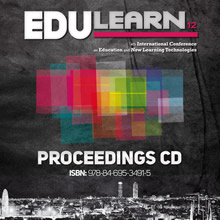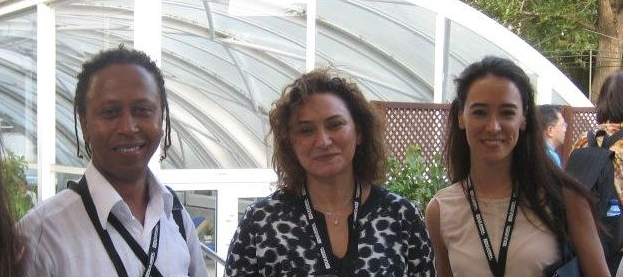Notes from the 4th International Conference on Education and New Learning Technologies (EDULearn12)
 Notes from the 4th International Conference on Education and New Learning Technologies (EDULearn12) July 2-4, 2012
Notes from the 4th International Conference on Education and New Learning Technologies (EDULearn12) July 2-4, 2012
by Hülya Görür-Atabaş
The 4th International Conference on Education and New Learning Technologies (EDULearn12) organized by The International Association of Technology, Education and Development (IATED)was held in Barcelona, Spain. The conference, that provided a wide array of interesting and diverse views in the field of education and e-learning, brought together 750 participants from more than 80 different countries. Its’ main aim was to provide a platform for participants to network with other colleagues; to have a unique opportunity to share experiences and to learn from each other. During the conference, many different educational topics were addressed, such as…
Pedagogical Innovations. Learning and Teaching Methodologies University-Industry Cooperation Barriers to Learning & Student Support in Education Virtual Learning Environments (VLEs) Quality Assurance. Standards and Accreditation Academic Research Projects Educational Trends and Best Practice Contributions International Projects. Internationalization of Universities VLEs & Virtual Universities e-Learning and Online Assessment Evaluation & Assessment of Student Learning International Projects. Outcomes and Conclusions Pre-service Teacher Experiences Experiences in Educational Management Experiences in Business Education Impact of Education and ICTs in Development The Bologna Declaration and ECTS Experiences Tutoring and Coaching Vocational and Workplace Training
 The conference was an International Forum for those who wished to present their ideas, research and projects in order to discuss the latest innovations, developments, practices and results in the field of New Technologies in Education, E-learning and methodologies applied to Education and Research.
The conference was an International Forum for those who wished to present their ideas, research and projects in order to discuss the latest innovations, developments, practices and results in the field of New Technologies in Education, E-learning and methodologies applied to Education and Research.
In an effort to build a database as well as encourage dialogue and foster innovation in the areas mentioned above, the proceedings have been made available as an ISBN publication.
Sabancı University, School of Languages was represented at this conference by
- Tülin Süral and Ahmed Elmahi who in a joint presentation focused on the use of online newspapers,
-Hülya Görür-Atabaş who in one of her presentations focused on possible applications of inquiry-guided learning, and in another presentation provided an alternative approach to dealing with plagiarism.
Following are excerpts from the abstracts of their presentations.
TEACHING THE DIGITAL GENERATION: USING ONLINE NEWSPAPERS
by Tülin Süral and Ahmed Elmahi: The development of the Internet brought a revolution in the world of teaching. Students are now able to get news, sports scores, Twitter posts, friends’ Facebook updates, and other information of interest on their mobile phones. They can access hundreds of newspapers worldwide. With the rise of the digital media, many newspapers and periodicals have created online sites enabling readers to comment on articles, participate in discussion boards and listen to news podcasts. As a result, students and teachers have more language acquisition resources at their disposal today than ever before.
Reading is one of the best ways to help students improve their language proficiency. Studies have shown that students who use newspapers develop better reading comprehension skills and stronger critical thinking skills. Even though there is an abundance of reading materials available for the students, teachers often complain about their students’ poor reading habits, lack of motivation and interest. In this paper, we explore how working with on-line English language newspapers and magazines could be used as powerful tools in the language classroom to develop an aptitude to read and respond critically. Fostering positive attitudes and motivation for reading will also be discussed.
INQUIRY= LEARNING: A MODEL FOR INQUIRY-GUIDED LEARNING by Hülya Görür-Atabaş
Coming to “a fork in the road” is very often a daunting experience for many foreign language learners. Yet, it can also be an inspirational one. The goal of my Inquiry Guided Learning Project has been to train Freshman students, enrolled in the Freshman English course of an English medium university, in how to decide on “the right turn” when it comes to coping with decisions regarding what they learn and how they learn it. My project was devised in line with:
- Freshman English course objectives of the institution,
- an adapted version of the can-do statements of the European framework,
- and learners’ individually set objectives. This framework was then applied over a 15-week-course through a series of input sessions, independent study activities and tasks, regular group and individual feedback, and interviews.
GREAT EXPECTATIONS: PLAGIARISM REVISITED by Hülya Görür-Atabaş
Writing is a skill that is usually met with discomfort and uncertainty. Thus it should not be surprising if learners resort to take various “shortcuts”, like adopting other writer’s ideas, and committing plagiarism. But how can we assist our learners in gaining a sound understanding of what it means to “plagiarize”? Are codes of conduct, and various inexplicable rules and punishments, the only way to prevent plagiarism? Can we as educators do anything that has a more long-term effect and benefit for the learner? Do we need to go into combat with plagiarism detection programs (e.g. Turn-It-In) or is there a more peaceful way of solving this issue in our classrooms? This paper provides a glimpse of a small-scale study that aimed at sharing an alternative approach to “plagiarism” by looking at perceptions, processes, materials, some research data, and insights gained that students enrolled in the Freshman English course at an English medium university went through.
Please feel free to get in touch in case you would like to find out more about the conference and/or presentations.
Disclaimer: Parts of this article have been adapted from the IATED website.

